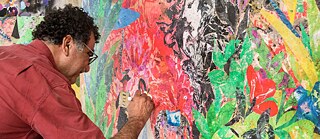Mohamed Abla
Egypt
Mohamed Abla has returned his Goethe Medal in March 2024.

Award statement
Mohamed Abla sees himself as a mediator between Egypt and Europe. He believes that artists have a social responsibility and that their lives cannot be separated from their work. For decades, he has been committed to tolerance and diversity, especially in the Egyptian cultural scene, and has campaigned for freedom of expression. As a multimedia artist, his central motivation is to familiarise a national and international audience with every facet of Egyptian society. Whether realistic portrayals of contemporary, social and political themes or abstract depictions of Egypt and its people, Mohamed Abla’s oeuvre not only provides thorough insights into the artist’s roots and his country’s society, but also into Egypt’s rich heritage. Over the years, Abla has developed a unique artistic language that helps him express his opinions via his works.Editorial note: In a 10-year-old critical media report on political cartoons in Egypt, Mr. Abla is also mentioned; However, research and clarification by the author of the report have shown that this criticism does not aim at Mr. Abla.